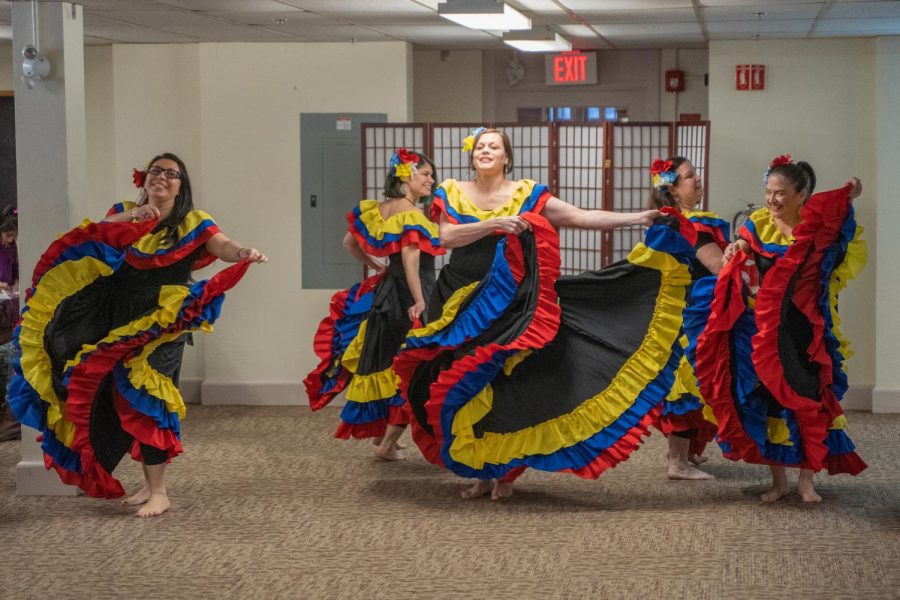On Thursday, the Center for Women and Community at the University of Massachusetts hosted an event in honor of International Women’s Day.
The celebration, which nears its 20th year, was co-sponsored by the International Programs Office, African American Studies Department, Women, Gender and Sexuality Studies Department and Auxiliary Services and drew in students, staff and families from the area.
Speakers, a poet and dancers were featured at the event, as well as different activities for attendees to engage with. Available was a button making craft, a station to honor women from attendees’ personal lives and a slideshow showcasing influential women and non-binary persons.
“We made a point to include people from around the world, not only from the U.S.,” said Hind Mari, director of the Women of Color Leadership Network at UMass.
The event was specifically tailored to be a celebration of womanhood, Mari noted, saying, “It’s not always [about] concentrating on the bad things that happen to women. [For] one day, at least, we want to be celebratory.”
“We like it to be celebratory because we recognize the oppression of women, essentially, and we recognize that sexism and racism and structural inequity and poverty, all of those things are happening,” said Becky Longwood, associate director of counseling and rape crisis services at the Center for Women and Community. “So we want to have a celebration of women’s power and action, and more recently we have broadened that to include non-binary activists…there’s not so many opportunities to come together and celebrate. There’s a lot of opportunities to talk about all the challenges.”
The event began with a brief history of the holiday, after which spoke the first featured performer – Amina Jordan-Mendez, a teaching artist in Holyoke and Springfield. Jordan-Mendez read three original poems revolving around themes of femininity and Blackness.
She stated that her work was inspired by thinking about her own humanity, and that she hoped the poems would showcase her ability to be “tender, genuine and vulnerable,” things that are not commonly associated with Black women. Mendez said that she wanted to show other Black women that these are things that they can experience.
Afterward, Stephanie Shonekan, professor and chair of the W.E.B. DuBois Department of Afro-American Studies, took the microphone to speak about the topic of Black women and love. Shonekan drew on music as both a source of information and testimony to her argument.
“I believe that music can show us and help us think about the world that we live in. I believe that most departments of music in this country do not deal with popular music, which I think is the genre and the culture that really exposes a lot of what is going on around us,” said Shonekan.
Shonekan drew on a study conducted about online dating, explaining “there was a study done and the question they asked, they asked Black men, white men, Asian men and Hispanic men, ‘What are you most attracted to the women of the same categories?,’ and of course, guess who was at the bottom of the list? Black women.”
She furthered by citing the U.S. Census from 1998, noting that in the age category of 30-34, 17 percent of white women had never been married, compared to 47 percent of Black women. In 2018, this changed to 26 percent of white women aged 30-34 never being married, while the number of black women in this category remained the same at 47 percent.
Using songs by SZA, Mary J. Blige and Beyoncé, Shonekan showed how “Black feminism is a space, an ideological space, where we can think of the specific, unique journeys that we have as black women which are different from others. The prioritizes we have that are different from other women.”
Shonekan ended by referencing the census data again and the conclusions drawn from it, “those truths are having traumatic effects on the lives of a number of people in this room, or friends of yours, or neighbors of yours. What are we doing about that and how might we want to interrupt the trend of these numbers?”
The event ended with performance by Latina dance group “Grupo Folklorico Tradiciones,” which featured dancers who also work in the Amherst Regional Public Schools.
“Outside of the U.S., International Women’s Day is a really big holiday, and often people that come here from other countries are surprised that there’s not more celebrations happening, or there’s not more recognition of it,” said Lockwood.
Irina Costache can be reached at [email protected] and followed on Twitter @irinaacostache.




















